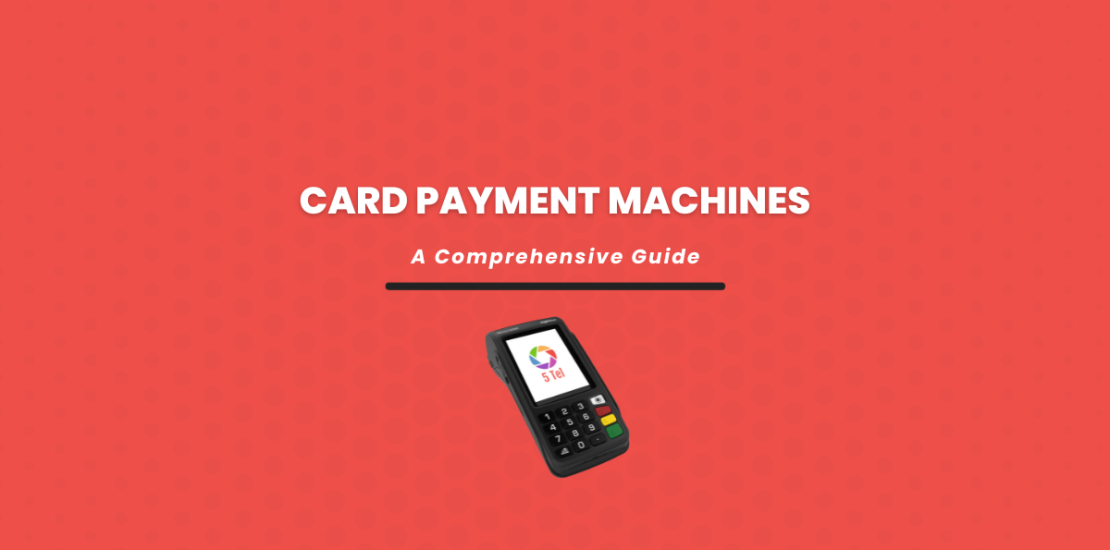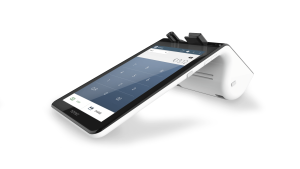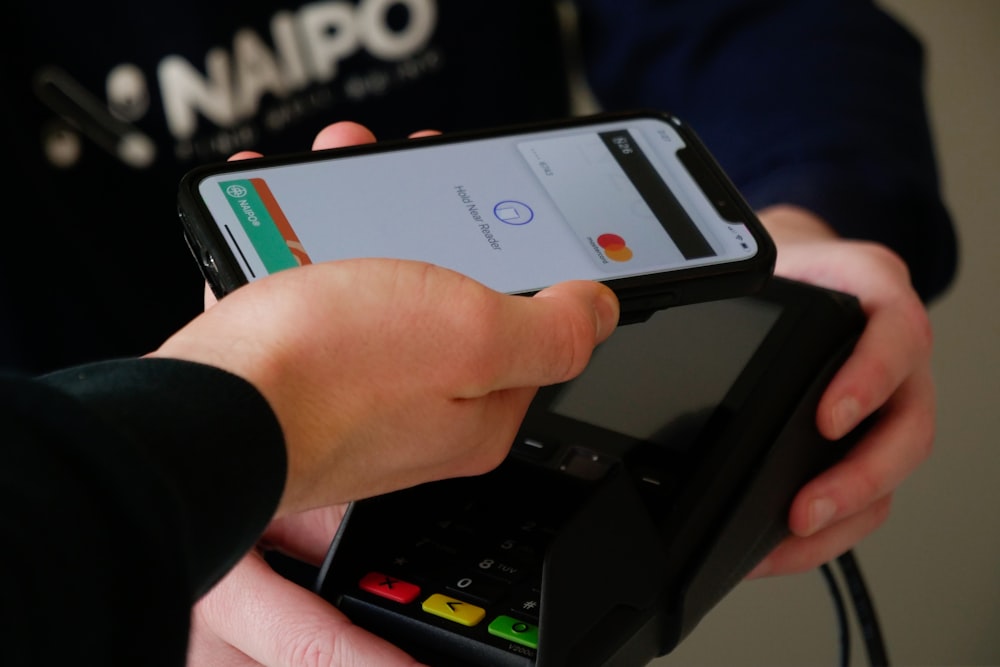- 29/09/2023
- Posted by: khuram
- Category: Card Payments

Card Payment Machines: A Comprehensive Guide
In the fast-paced world of modern commerce, businesses need to be able to process payments quickly, securely, and conveniently. Card payment terminals play a crucial role in meeting these needs. These devices are no longer a luxury but necessary for businesses of all sizes and types, from bustling retail stores to freelance consultants working in coffee shops.
Understanding how payment machines work and the types available can help you select the best solution for your business. From enhancing your customer experience to ensuring transaction security, these machines play a pivotal role in achieving your business goals.
In this comprehensive guide we’ll run through everything you need to know about card payment machines, so you can confidently make the right choice for your business needs.
Whether you’re a seasoned business owner looking to upgrade your existing payment infrastructure or a newbie setting up your first payment processor or gateway, this guide aims to simplify the complex world of payment machines. It will serve as your reliable roadmap, guiding you through the maze of choices towards a solution that’s just right for your business.
What are Card Payment Machines?
A card payment machine, also known as a credit card terminal or PDQ (Process Data Quickly) machine, is a payment machine that enables businesses to process debit and credit card transactions.
These devices play a critical role in facilitating seamless and secure transactions, thereby enhancing the transactional experience for customers and driving sales for your business.
Primary Functions of Card Payment Terminals
Payment Processing: The primary function of a card reader or payment machine is to process payments made via credit and debit cards. When a customer swipes or taps their card or phone, the device reads the card’s details and communicates with the cardholder’s bank to authorise the transaction.
Print Receipts: Post transaction, card payment machines generate physical or digital receipts, offering the customer and the business a transaction record.
Supports Various Card Types: These machines are designed to accept various types of cards – debit, credit, and even contactless payment cards such as mobile payments, like Apple Pay or Google Pay.
Provide Security: Card payment machines encrypt card details during each transaction, offering a secure payment method that protects businesses and customers from fraudulent activities.
Understanding the functions and capabilities of card payment machines is essential for any business. It provides convenience to customers and safeguards business operations, supporting smoother, quicker, and safer transactions.
Types of Card Payment Machines
There are several card payment machines are available, each with unique features, uses, and benefits. Understanding the differences, their features and benefits can help you choose the best one for your business.
Countertop Card Machines
Countertop card machines are standard in retail outlets, cafes, and restaurants. These are stationary units usually placed near a cash register or customer service desk.
Features of Countertop Card Machines
Connectivity: These machines connect to the internet via an Ethernet cable or a telephone line, ensuring a stable internet connection and reliable payment processing.
Easy to Operate: The user-friendly interface of these machines makes them easy to operate and helps ensure quick and efficient transactions.
Security: They adhere to high-level encryption standards, ensuring all transactions comply with the Payment Card Industry Data Security Standard (PCI DSS).
Suitable Business Types
Countertop card machines are an ideal fit for businesses with a fixed point of sale, including retail stores, coffee shops, hotels, and restaurants. Companies like 5Tel offer a range of countertop machines tailored to the needs of different businesses.
Portable Card Machines
Portable or wireless card machines offer the flexibility of accepting payments anywhere within your business premises.
Features of Portable Card Machines
Wireless Connectivity: These devices use Wi-Fi or Bluetooth for internet connectivity, allowing you to take the device to your customers.
Flexibility: These machines’ mobility can enhance customer service and the overall experience.
Long-lasting Battery: Portable machines are designed with extended battery life, allowing them to last through a busy day without recharge.
Suitable Business Types
Portable card machines are perfect for businesses such as restaurants, salons, spas, and hospitals, where payments must be accepted at different locations. 5Tel’s range of portable card machines are specifically designed for such requirements, providing excellent connectivity and security.
Mobile Card Machines
Mobile card machines take the concept of mobility a notch higher. These machines have been designed for businesses that are always on the move.
Features of Mobile Card Machines
Built-in SIM: Mobile card machines feature a built-in GPRS SIM card, ensuring connectivity even without Wi-Fi.
Compact and Lightweight: These machines are the perfect solution for small businesses on the go, they are compact, lightweight, and easy to carry..
Wide Range of Payment Options: Besides card transactions, many mobile card machines can accept mobile payments through platforms like Apple Pay and Google Pay.
Suitable Business Types
Ideal for businesses like food vans, event ticketing, home services, and market stalls, mobile card machines improve the ease and efficiency of payment collection. 5Tel offers a variety of mobile card machines that are durable, lightweight, and designed for superior performance.
In conclusion, countertop, portable, and mobile card machines serve different business needs and operational structures. While countertop machines are ideal for stationary businesses, portable and mobile machines offer varying degrees of mobility, making them suitable for companies requiring flexible payment collection. The right choice depends on your unique business needs and customer expectations.
How Card Payment Machines Work
Making a transaction with a card payment machine might seem simple from the outside – swipe, tap, or insert your card, wait for a few seconds, and it’s done.
However, behind this seemingly straightforward process lies a complex network of systems and protocols that ensure your transaction is conducted securely and efficiently.
Here’s a simplified step-by-step breakdown of what happens when a customer swipes their card to the point when the funds transfer to your account.
The Transaction Process
- Card Swiped, Tapped, or Inserted: The first step in the transaction process is when the customer swipes, taps, or inserts their card into the machine. The machine reads the information on the card’s magnetic strip or chip.
- Transaction Details Captured: The card machine captures the transaction details, including the card number, expiration date, CVV, and transaction amount.
- Encryption and Transmission: The card machine then encrypts these transaction details for secure transmission. The encrypted information is sent to the merchant’s acquiring bank.
- Authorisation Request: The acquiring bank sends the transaction details to the cardholder’s issuing bank, requesting authorisation for the transaction.
- Transaction Approval or Denial: The issuing bank checks the cardholder’s account for sufficient funds or credit. If funds are available, the bank approves the transaction; if not, it denies it.
- Merchant Notification: The acquiring bank returns the approval or denial message to the card machine. The card machine then prompts a message indicating whether the transaction was successful.
- Funds Transfer: The issuing bank will transfer the funds to the merchant’s acquiring bank if approved.
- Transaction Record: At the end of the day, the merchant will send a batch of that day’s transactions to the acquiring bank, initiating the final settlement of funds.
Card Industry Data Security Standard (PCI DSS)
The importance of safeguarding sensitive cardholder information cannot be understated. Thankfully, the Payment Card Industry Data Security Standard (PCI DSS) exists to support all businesses.
What is PCI DSS?
The Payment Card Industry Data Security Standard (PCI DSS) embodies a collection of security benchmarks established with the intention of safeguarding environments where businesses handle credit card information.
This includes activities such as accepting, processing, storing, or transmitting such data. This suite of standards was the collaborative creation of notable payment titans like Visa, MasterCard, American Express, Discover, and JCB, who constitute the founders of the PCI Security Standards Council.
Relevance of PCI DSS to Card Payment Machines
The PCI DSS is relevant to card payment machines because they play a critical role in the transaction process, handling sensitive cardholder data. These machines must comply with PCI DSS requirements to ensure the secure handling of this data.
- Establish and Sustain Secure Networks and Systems: This encompasses the tasks of setting up and consistently managing a firewall, along with modifying default security parameters and passwords provided by vendors.
- Safeguard Customer Payment Information: It’s crucial to secure customer payment data, irrespective of where it’s saved. Also, any transfer of such data over public networks should use encryption methods for maximum security.
- Uphold a Robust System Security Management Program: This program protects systems from harmful software and the consistent renewal of anti-malware applications.
- Enforce Rigorous Authorisation Control Strategies: These strategies limit accessibility to sensitive data only to individuals whose roles necessitate such access.
- Regularly Monitor and Test Networks: Monitoring and testing can help identify potential weaknesses in systems and networks that could be exploited.
- Maintain an Information Security Policy: The policy should be established, published, maintained, and disseminated to all relevant personnel.
For businesses in the UK, compliance with PCI DSS is more than just good business practice. It’s a requirement for companies that accept card payments; non-compliance can lead to fines, penalties, or even the loss of the ability to accept card payments.
Ensuring that card payment machines are PCI DSS compliant is critical in protecting businesses and consumers from data breaches and financial fraud. With the ever-growing prevalence of card payments, understanding and implementing these standards are integral to maintaining trust in the digital transaction ecosystem.
The Shift to Tap-and-Go-Transactions
The world of payments has experienced a significant evolution, particularly in the last decade. One notable shift has been towards tap-and-go transactions, driven by both technological advances and changing consumer behaviours.
Why Are Contactless Payments Gaining Popularity?
Electronic payments, where transactions are made by simply tapping a card, smartphone, or wearable device on a card payment machine, are gaining popularity for several reasons:
- Convenience: They are swift and straightforward. There’s no need to input a PIN or sign a receipt for small transactions, making it perfect for fast-paced environments like cafes or supermarkets.
- Safety and Hygiene: The recent global pandemic has accelerated the move to contactless, as it reduces the physical touchpoints, promoting a safer and more hygienic transaction experience.
- Increased Transaction Limits:
Currently, the contactless payment limit is £100, which was increased in 2022; prior to this, the payment limit was £45. The higher limit makes contactless a viable option for a broader range of purchases.
Role of Credit Card Machines in Contactless Payments
With the surge in contactless, credit card payment machines have evolved to accommodate this new form of transaction. Modern card machines are equipped with Near Field Communication (NFC) technology that allows them to communicate wirelessly with contactless cards and devices, enabling tap-and-go transactions.
Companies like 5Tel provide a range of card payment machines that support contactless payments. Not only do these machines offer businesses the ability to accept traditional card payments, but they also cater to the growing demand for contactless transactions.
With these advancements, credit card payment machines are not merely transactional devices anymore; they are integral to delivering a smooth and modern customer experience. By embracing the shift to contactless payments, businesses can ensure they stay relevant and meet the evolving payment preferences of their customers.
Security Features of Modern Card Payment Machines
The importance of stringent security measures in current card payment machines cannot be overstated. With the goal of minimising threats such as data leaks, unauthorised access, and fraudulent activities, today’s devices are equipped with sophisticated security attributes.
Here, we will delve into some of the key security aspects of today’s best credit card and payment machines.
EMV Compatibility
EMV (Europay, MasterCard, Visa) is a global standard for credit and debit card payments to replace magnetic strip cards with more secure chip cards.
EMV cards have an embedded microchip that generates a unique code for each transaction, providing a greater level of security than traditional magnetic strip cards. Nearly all modern card machines, including those from 5Tel, are EMV compatible, ensuring secure, chip-based transactions.
Encryption
Encryption is another crucial security feature of modern credit card machines too. It transforms sensitive cardholder data into a code decoded using a specific key. This ensures that even if data is intercepted, it remains unreadable and useless to potential fraudsters.
Tokenisation
Tokenisation replaces sensitive card data with unique identification symbols (or “tokens”) that retain all the essential data of the card without compromising its security.
This means the card data can be used for transactions without exposing sensitive information, reducing the risk of data breaches.
PCI DSS Compliance
As discussed earlier, PCI DSS (Payment Card Industry Data Security Standard) compliance is mandatory for all businesses that accept, process, store or transmit credit card information.
Compliant card readers and payment machines help ensure the secure handling of cardholder data, reducing the risk of data breaches and fraud.
Choosing the Right Card Payment Machine for Your Business
Given the many choices available, selecting the ideal card payment machine for your small business can seem overwhelming. However, by considering certain key factors, you can simplify this process and ensure you select a device that aligns with your unique needs and operations.
Nature of Your Business
The first factor to consider is the nature of your business.
Retail businesses with a fixed point of sale would benefit from countertop card machines. In contrast, companies that require mobility within their premises, like restaurants or salons, would find portable card machines more suitable. For businesses on the move, such as food vans or market stalls, mobile card machines provide the flexibility they need.
Volume of Transactions
Your transaction volume is another crucial consideration. High-volume businesses require a card machine to handle numerous transactions without compromising speed or reliability.
Range of Payment Methods
In today’s digital era, it’s essential that your card machine can accept a range of payment methods – from traditional chip and PIN transactions to contactless and mobile payments like Apple Pay and Google Pay.
Security Features
Ensure your card machine comes with robust security features such as EMV compatibility, encryption, and PCI DSS compliance. This safeguards your business against potential fraud and instils trust in your customers.
Cost Considerations
Consider the costs involved – not just the upfront cost of the machine itself but also transaction processing fees and any additional costs for support services. Aim for a balance between price and quality to get the best value.
Customer Support
Lastly, consider the level of customer support provided. Companies like 5Tel offer 24/7 UK-based customer support, ensuring help is available when you need it most.
Careful consideration of these factors, will help you can choose the best credit card machine payment machine that fits your business perfectly, enhancing efficiency and customer satisfaction
How 5Tel Can Help You with Your Card Payment Machine Needs
Choosing a suitable card payment machine is crucial for businesses. Here at 5Tel, we understand this need and are committed to providing businesses with the most suitable card payment solutions.
5Tel’s range of card machines caters to a broad spectrum of businesses. Whether you own a brick-and-mortar store requiring a countertop card machine, operate a bustling restaurant needing a portable device, or run a mobile business like a food van and need a mobile card machine, we’ve got you covered.
All of our card machines are designed with cutting-edge technology, ensuring fast and secure transactions. They accept various payment methods, from traditional chip and PIN to contactless and mobile payments such as Apple Pay and Google Pay.
Moreover, at 5Tel, we prioritise security. Our machines fully comply with the Payment Card Industry Data Security Standard (PCI DSS), ensuring the safety for your business and your customers. Furthermore, our devices have enhanced security features such as EMV compatibility and robust encryption.
But we continue providing you with top-of-the-line hardware. We also offer a flexible contract structure with zero exit fees and competitive pricing plans that cater to different business sizes and needs. And to top it all, our UK-based customer support is available 24/7, ensuring you receive timely help whenever needed.
At 5Tel, we aim to support your business by making card payments quick, easy, secure, and affordable. Let us guide you on your journey to improved efficiency and increased profits.
Conclusion
In conclusion, the world of card payment machines might seem complex, but it becomes much more straightforward with the right guidance. And that’s where we, at 5Tel, step in. With our broad range of devices, comprehensive support, and commitment to your business’s growth, we ensure your credit card machine payment experience is smooth and hassle-free.
Ready to make your card payment experience seamless? Contact 5Tel now for your personalised credit card processing and payment solution!



